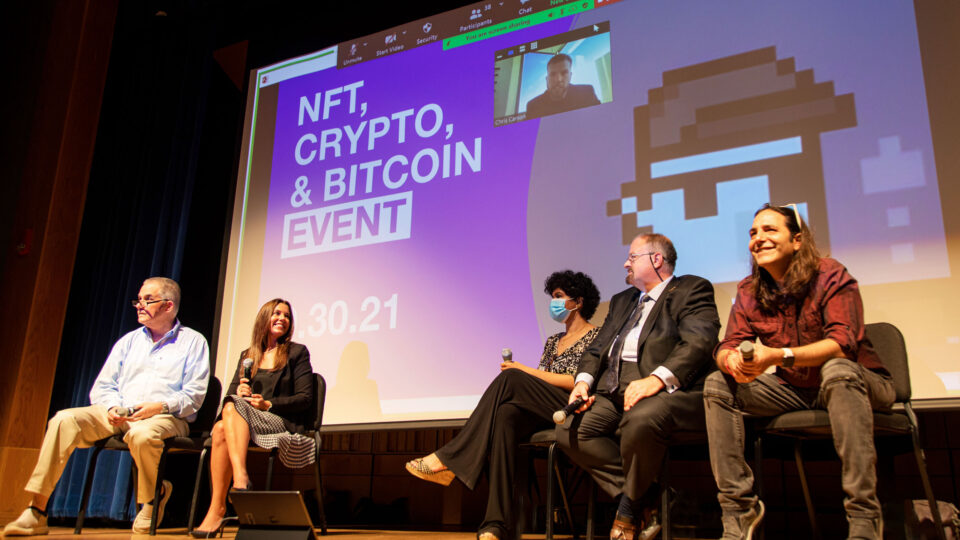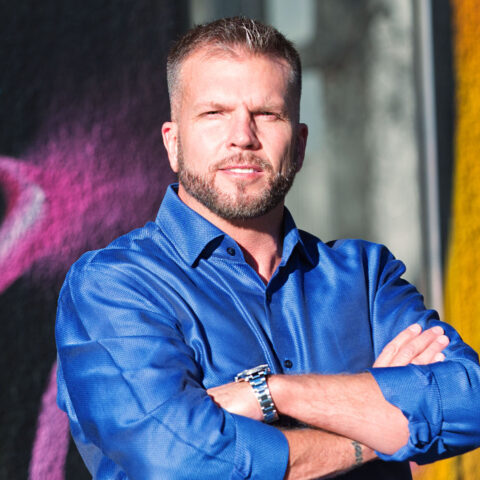Silicon Valley entrepreneur Chris Carson '97 has an uncanny ability for recognizing inspiration wherever it appears.
Decades before founding Hayden AI, a civic application of artificial intelligence and blockchain technology for traffic management, Carson was inspired by Operation Desert Shield and enlisted in the U.S. Marine Corps. In 1990, he participated in the liberation of Kuwait and earned a pivotal role as a special operations team member in the Fleet Anti-terrorism Security Team (FAST), a company of rapid-response, close-quarter battle Marines who serve as security at U.S. government installations.
Carson was intrigued by the technology of autonomous defense systems—an inspiration he would deploy years later in a much more civilian form with Hayden AI.
Tour of duty complete
The Boca Raton native enrolled at Lynn University. As a member of Pi Lamba Phi, he spearheaded the adoption of the Greek system at Lynn. His bachelor's degree in international business management and Asian studies inspired his move to China after graduation.
"China started encouraging automation and I was gaining some experience in computer vision technology," he said.
Computer vision is an AI technology that mimics human vision, enabling computers to see and identify images and translate them into text-based information. Factories use it as a quality control measure for finding defects in automated manufacturing.
Carson went on to enroll in graduate school at Tokyo's Waseda University. His dissertation on Information Architecture-Computer Vision centered on mapping for security robots.
He landed in the epicenter of Japanese manufacturing, Nagoya, where he worked as a director in the innovation unit of Mitsubishi Heavy Industries.
"I saw a really clear application there, to take autonomous systems and apply that technology to vehicles. But self-driving cars are still a decade away," Carson said. "There were other spaces to apply it."
Enter startup phase
Resettled in the San Francisco Bay area, Carson became a serial entrepreneur, building tech companies out of the proverbial garage.
"I've had successes and failures," he said. "You have to have the stomach to go through those highs and lows to help you make all of those necessary course corrections."
Already in founder mode and primed by the insights and skills gained through military service, academic life and career experiences, Carson was in a perfect position to recognize an opportunity on a San Francisco bus.
"I noticed the driver had a camera on the window, and every time he saw a car parked in a bus lane, he manually pushed a button to take a photo of the car," he said. "This was an inefficiency technology could solve."
This led him to cofound Hayden AI, the fast-growing technology company developing the first autonomous traffic management platform in the world. The company uses spatially aware mobile super sensors, which are much more effective, agile and affordable than fixed systems like red-light cameras. Attached to a city's bus fleet (or police cars, street sweepers and school buses) these sensors see and reason in 3D and, in combination with AI and blockchain, automate bus lane enforcement.
"With our technology on city buses, fewer people abuse the bus lanes and bus stops. So that speeds up bus on-time arrival by 20 to 30%, which means more passengers will ride the bus, which reduces congestion, reduces pollution, improves sustainability," he said.

Mission accomplished
In September 2021, CEO Carson and his team raised $20 million in Series A funding, for a total of more than $30 million since founding the company in 2019.
Inspiration, technical knowledge and cash cannot be understated for a startup. But in Silicon Valley, timing is everything.
"Essentially, computer vision technology has matured enough to enable this kind of sophisticated application, but it's also a matter of the legislation being in place to support it and the desire to adopt the digital transformation of traffic enforcement," he explained. "The genesis of this company depended on the inflection of all of these elements."
Hayden AI's perception systems remove humans from the traffic enforcement loop, reducing confrontation and bias, allowing algorithms to identify noncompliance. Carson sees this not only as a way of making enforcement more equitable, but also making mobility and commuting more equitable.
Blockchain technology is the final element to seal Hayden AI's first-of-its-kind traffic system, which is already being piloted in cities around the world. Blockchain allows Hayden AI to securely provide an encrypted evidence package of violations to processors or ticketing agencies through a transparent chain of custody, tracking and securing the process.
Today Carson gives back to Lynn as an expert in his field. At Lynn's September live panel discussion about NFTs, cryptocurrency and blockchain technologies, he provided perspective on reimagining blockchain, not as a high-risk crypto investment, but as a tool to bolster confidence in the traceability of data.
"You can build an entire industry around blockchain," Carson said. "It's allowing us to capitalize on big data to make traffic safer and more sustainable in cities here and internationally. It's a game changer."
A proud husband and father, Carson is a serial entrepreneur who has a passion for motorcycle racing, international travel and foreign languages. His dream is to use his resources to end human trafficking.

Share this page